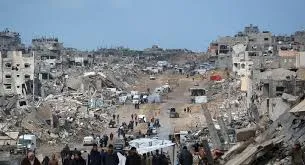Abu Dhabi [UAE]: In a high-level diplomatic meeting, UAE Foreign Minister Sheikh Abdullah bin Zayed Al Nahyan received Israeli Foreign Minister Gideon Sa’ar in Abu Dhabi on Sunday, to discuss deepening bilateral ties and address urgent regional issues, including the humanitarian crisis in Gaza.
Strengthening Bilateral Relations
Sheikh Abdullah welcomed Minister Sa’ar, reaffirming the growing cooperation between the UAE and Israel. The two officials acknowledged the importance of maintaining open dialogue and collaboration across diplomatic, economic, and humanitarian fields.
Focus on Gaza and Humanitarian Aid
The primary focus of the meeting was the escalating humanitarian situation in Gaza. Both leaders stressed the urgent need for a ceasefire, the safe release of hostages, and unhindered humanitarian aid delivery to civilians in the region.
“The humanitarian crisis in Gaza is worsening by the day,” said Sheikh Abdullah, urging all nations to work together to prevent further escalation and ensure that vital aid reaches those in need.
He underlined the UAE’s unwavering support for the Palestinian people’s right to self-determination and reaffirmed the country’s commitment to providing humanitarian assistance.
A Call for Peace and Stability
Sheikh Abdullah highlighted the urgent need for a serious political horizon to relaunch negotiations for a two-state solution, emphasizing the importance of ending extremism, rising tensions, and violence.
He called on the international community to join forces in promoting security, stability, and dignity for all people in the region, built on the values of tolerance, coexistence, and human fraternity.
“These values are not only moral imperatives,” he said, “but essential pillars for building safe, stable, and prosperous societies.”
Officials in Attendance
The meeting was also attended by Saeed Mubarak Al Hajeri, Assistant Minister for Economic and Trade Affairs, and Mohamed Mahmoud Al Khaja, UAE Ambassador to Israel.
With this crucial dialogue, the UAE continues to play a key role in regional diplomacy, aiming to bridge gaps, promote peace, and alleviate suffering through coordinated humanitarian and political efforts.























